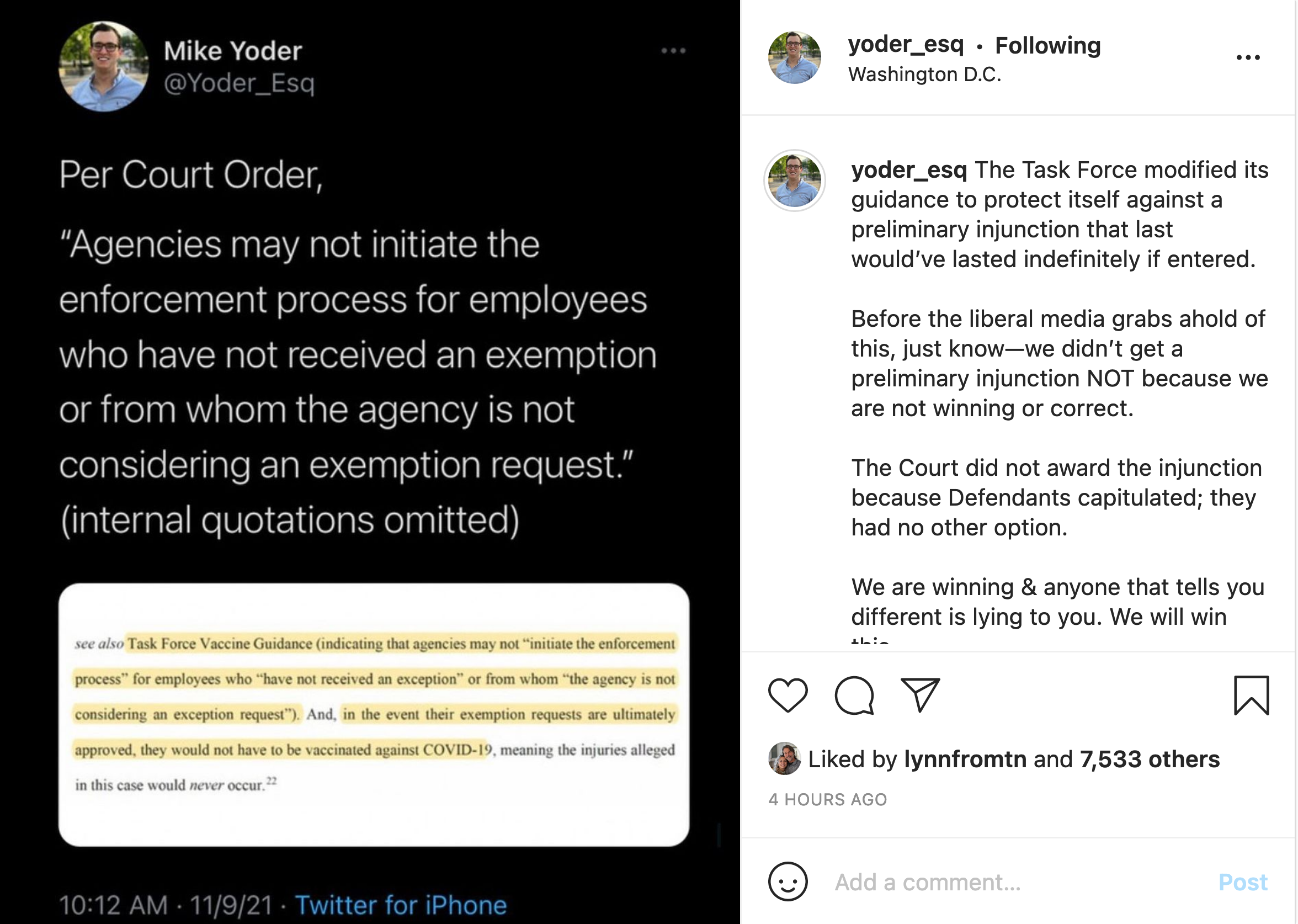On Monday, in Church v Biden, Judge Colleen Kollar-Kotelly denied the Plaintiffs' emergency application for a temporary restraining order (TRO) and motion for a preliminary injunction. Despite the judge's denial, the 41-page order establishes that the Plaintiffs seeking an exemption from receiving any COVID-19 vaccine due to a sincerely held religious belief will not lose their jobs while their request is pending. Pleased with the proceedings thus far, Plaintiff attorney Mike Yoder told UncoverDC the ruling just as easily could have been "denied as moot." He explained there is currently no need for an injunction because "we've been successful in getting the government to change their position."
Yoder commented the court's denial of the injunction was due to modifications made by the Defendants—the U.S. government—to the Safer Federal Workforce Task Force (Task Force) to "protect itself against a preliminary injunction that would've lasted indefinitely if entered." He added, "Before the liberal media grabs ahold of this, just know—we didn't get a preliminary injunction NOT because we are not winning or correct. We are winning, and anyone that tells you different is lying to you. We will win this."
 Screenshot / Mike Yoder Instagram
Screenshot / Mike Yoder Instagram
Task Force guidance directs that "federal employees need to be fully vaccinated by November 22, 2021." CDC guidelines dictate that an individual is not "fully vaccinated" until two weeks after receiving the required number of doses of a COVID-19 vaccine. That means federal employees must have received their "last dose of the vaccine by no later than November 8, 2021, to meet the November 22, 2021 deadline to be fully vaccinated." Plaintiffs' concerns arose, as the initial lawsuit points out, over the particulars surrounding the government directive that federal employees who fail to comply with the deadline and "have neither received an exception request nor have an exception request under consideration" are "subject to discipline, up to and including termination or removal." 
https%3A%2F%2Funcoverdc.wpengine.com%2Fwp-admin%2Fpost.php%3Fpost%3D32906action%3Dedit
Kollar-Kotelly stated that Defendants allege "there is no basis on the current record to assume that the federal employee Plaintiff exemption requests will be denied." In explaining her decision against injunctive relief, she wrote:
"Plaintiffs' 'extraordinary' request for immediate injunctive relief is not merited. At this early stage of the proceedings, the record reflects that each Plaintiff has requested an exemption to the very COVID-19 vaccine mandates they challenge. These exemption requests all remain pending, and during their pendency, no Plaintiff faces disciplinary action for refusing the COVID-19 vaccine. Plaintiffs, therefore, come before this court complaining of a compulsory inoculation they may never need to take and of adverse employment actions they may never experience. This uncertainty weighs decisively against the ripeness of Plaintiffs' claims and the irreparability of their purported injuries. Emergency injunctive relief is not appropriate under these circumstances."
Kollar-Kotelly touched on the Plaintiff's argument that Joe Biden's Executive Order 14043 (EO)—which requires that recipients of EUA-authorized medical products be "informed" of the "option to accept or refuse administration of the product"—violates the Food, Drug, and Cosmetic Act (FDCA). The court asserts these arguments revolve around unforeseen future events that may not occur as anticipated or even at all. Without disputing the Plaintiffs' claim there is no FDA "approved" vaccine, the order states, "in the event their exemption requests are ultimately approved, they would not have to be vaccinated against COVID-19, meaning the injuries alleged in this case would never occur."
The Judge's ruling underscores throughout the order that each Plaintiff confirms they have already submitted a request for a religious exception to the Federal Vaccine mandate in Biden's EO 14043. The court notes there is "no basis" on the current record "to assume" that the Plaintiffs' exemption requests will be denied. Considered on a case-by-case basis, the court stresses that hypothetical predictions and the "mere potential" for future injury are insufficient, pointing out that the exemption request for Special Agent Kristofor Hallfrisch has already been approved. Kollar-Kotelly explains that Defendants state that if a federal employee request is denied, appealed, and the appeal is then denied and they subsequently "face adverse reaction if they fail to get vaccinated against COVID-19," the federal government has "administrative appeal procedures" that offer additional opportunities to present arguments for exemptions.
In summarizing why Plaintiffs' have not shown substantial likelihood their request for emergency TRO and preliminary injunction are justified, Judge Kollar-Kotelly reiterated again that "each of the Federal Employee Plaintiffs alleges that he or she has already submitted an exemption request, and is awaiting a decision on the request." Concluding the court finds public interest outweighs the balance of harm to Plaintiffs in this decision, the Judge resolved:
"No Federal Employee Plaintiff has yet been compelled to receive a vaccine in contravention of their constitutional right to religious free exercise of related statutory objections. The record also indicates no Federal Employee Plaintiff will be subject to discipline for refusing the vaccine during the pendency of their present outstanding religious exemption requests. This exempted status currently allows the Federal Employee Plaintiffs to raise their religious objections to the vaccine, while also retaining their federal jobs. Under these circumstances, the Federal Employee Plaintiffs cannot rely on the presumption of irreparable harm that attaches to First Amendment violations, because no such violation has yet occurred. And it is unclear if any such violation will ever occur. An approved exemption request would allow the exempted federal employee to refuse the COVID-19 vaccine entirely."


